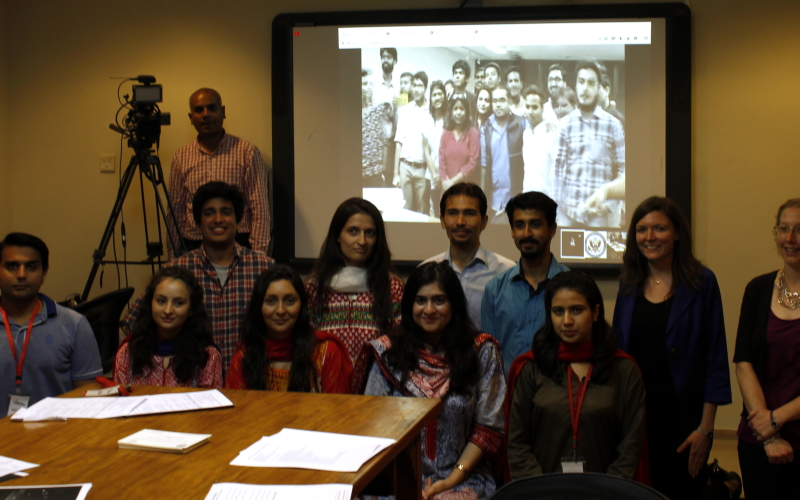By: Rimsha Ali Shah
“Once we are outside the geographical boundaries of our countries, Pakistanis and Indians become each other’s support system. This bond of friendship should not be constrained once we are back in our countries.”
These were the words of Sherzaman, a Community College Initiative Program alumnus from Pakistan, who shared his experience of having connected most with his Indian counterpart, Ankit while on his exchange program to the United States.
Thirty alumni from Pakistan and India echoed Sherzaman’s thoughts during an online peace dialogue organized by the Pakistan-U.S. Alumni Network and U.S. Embassy New Delhi. The event brought together a diverse group of youth activists, journalists, musicians, development practitioners and communications specialists who used a live video connection to not only discuss stereotypes and prejudices, but to have an action-oriented dialogue that focused on dispelling myths, bridging gaps, and promoting friendship between the two neighbors.
The two-hour discussion provided the young minds with a safe space to candidly discuss stereotypes on both sides … – from Bollywood superstars and Pakistani bowlers, to women’s rights, poetry and musicians, media biases, water disputes, and interfaith harmony. The dialogue touched on all pertinent matters and how, simultaneously, the hospitality, love and care among people of both countries was an exemplary show of cross-border friendship.
Irfan Haider, who recently attended the Global Youth Peace Festival in India, shared his experience of Indian hospitality. “I met this auto driver in Delhi and on telling him I was from Pakistan, he surprised me by buying me a Limca cold drink, in addition to giving me a great discount on the auto ride. All I could do at the time was to give him a jadu ki jhappi and so I did.”

Erin Mains, Assistant Cultural Attaché, U.S. Embassy Islamabad, stressed the importance of building on the partnerships created during participants’ exchange experiences in the United States. First Secretary for Exchanges and Education, U.S. Embassy, New Delhi Matthew K. Asada, recalled his tenure in Lahore and highlighted the striking similarities between the two countries. He remarked that dialogue was pivotal in bringing the people from both countries together for a meaningful exchange.

In a nutshell, the dialogue played a significant role in bridging gaps, surpassing stereotypes, busting myths and collaborating for peace and prosperity. As Shailey Tucker from U.S. Consulate Delhi said, “Such virtual conversations are significant in strengthening the people-to-people connections for peace promotion between both countries.”
Check out more pictures from the session: https://flic.kr/s/aHskmfqNBi

